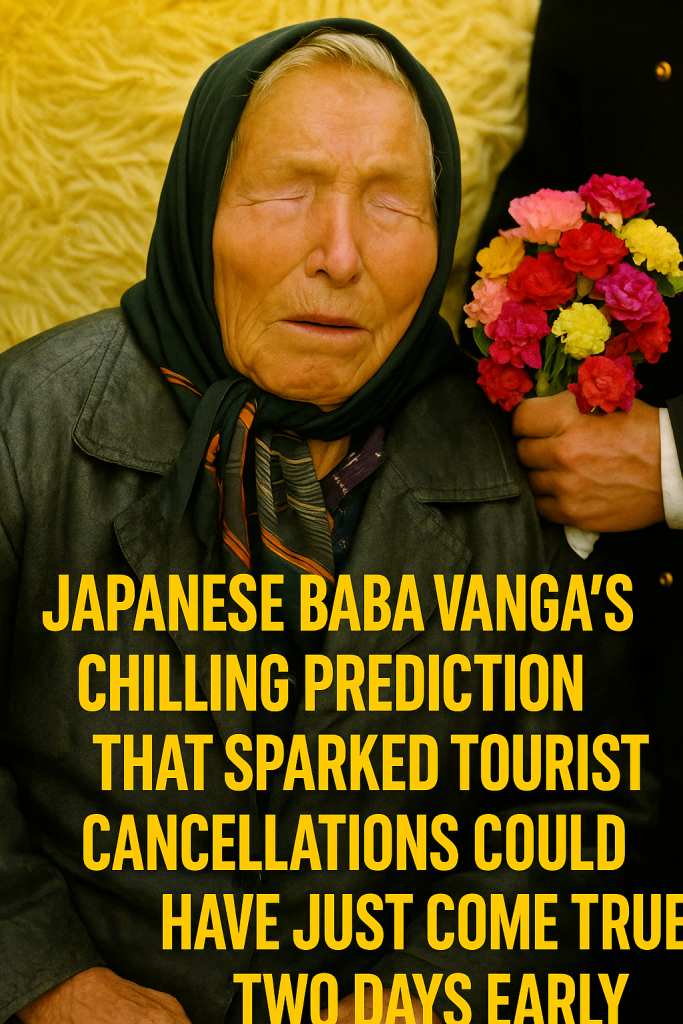In a bizarre twist that has captured international attention, a chilling prediction attributed to a Japanese figure often dubbed the nation’s own “Baba Vanga” appears to have come true two days ahead of schedule—prompting a sharp rise in tourist cancellations across Japan. The mysterious forecast, long whispered about in social media circles, warned of an unforeseen event with the potential to disrupt travel and tourism to the island nation.
The Prediction and Its Origins
The so-called “Japanese Baba Vanga” refers to a contemporary mystic whose enigmatic future insights gained popularity after a cryptic message circulated online. The text suggested that in early 2024, a sudden and unsettling phenomenon would unsettle the country’s hospitality and tourism industries.
Unlike the original Bulgarian seer Baba Vanga, known for global predictions, this Japanese counterpart’s prophecy links deeply with Japan’s cultural and social milieu, stirring particular anxiety among residents and visitors alike. Though details remain vague, the mention of early timelines and national impact made this forecast a topic of growing speculation in recent months.
The Early Arrival of the Event
Reports from multiple regions of Japan confirm unusual developments consistent with the prediction’s vague descriptions. While authorities have not officially linked these incidents to any supernatural forecasts, the timing and scale of disruptions have caused alarm.
Major cities known for high tourist influx, including Tokyo and Kyoto, witnessed a sudden drop in hotel bookings and flight reservations within just days of the prophecy’s alleged fulfillment. Travel agencies and tour operators noted a significant number of cancellations, some citing travelers’ apprehensions fueled by viral social media posts referencing the prediction.
Impact on Tourism and Economy
Japan’s tourism sector, which has been rebounding steadily after pandemic-related setbacks, now faces fresh uncertainty. Experts warn that even speculation and fear, regardless of factual basis, can dramatically affect travel trends and economic outcomes. Hospitality businesses are reportedly struggling to adapt to the swift change in booking patterns.
The tourism downturn could ripple through associated industries—restaurants, transportation, cultural venues—potentially challenging local economies that rely heavily on visitor spending. Meanwhile, public officials are urging calm and emphasizing the country’s preparedness to handle various scenarios, from natural disasters to unexpected social phenomena.
Social Media’s Role in Amplifying Anxiety
Much of the current panic stems from social media platforms where the haunting imagery and cryptic text of the prediction have gone viral. Users have shared the content extensively, often framing it as an eerie prophecy materializing in real time. This amplification has increased public anxiety and contributed to the surge in cancellations, illustrating the potent influence of digital rumor and folklore on modern behavior.
Is This Truly a Prophecy Fulfilled or Just a Coincidence?
While skeptics argue the prediction’s alignment with recent events is mere coincidence, believers remain convinced that the Japanese Baba Vanga’s words bear weight. Regardless of the truth behind the prophecy, the situation highlights how folklore and social narratives can tangibly impact real-world decisions and markets.
Looking Ahead
Authorities and tourism experts are closely monitoring developments. Initiatives to reassure visitors and promote safety protocols are underway to stabilize the sector. Meanwhile, for travelers planning to visit Japan, staying informed through official channels and taking precautions based on factual information is highly recommended.
As Japan navigates this unusual moment where folklore and reality intertwine, the global community watches with a mix of curiosity and caution—reminded that sometimes, the power of prediction lies as much in belief as in fact



